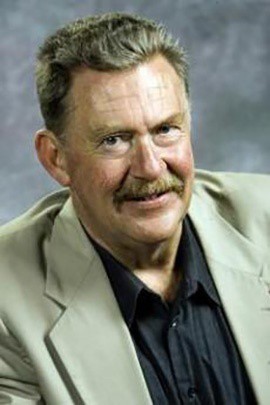
David Paul Thomas
Professor of Political Science, Emeritus
Paul Thomas began his academic teaching career at UC Davis (1972-74) and his research career as a Junior Research Fellow at Wolfson College, Oxford (1974-75). He was appointed to the faculty at the University of California, Berkeley, as an assistant professor of political science in 1975 and remained on the faculty for over 40 years, routinely referring to himself as "the luckiest man alive" for being able to do so. Paul cherished Berkeley, both the institution and the locale, and could often be seen frequenting its bookstores and record shops, strolling its streets, lunching with friends in cafes, or provisioning supper ingredients from its farmers' markets.
David "Paul" Thomas was born on April 7, 1943, in Chester, England. He died at the age of 73, on October 11, 2016, at Highland Hospital, Oakland, of multiple injuries from a traffic accident.
Paul spent his childhood in northwest England, attended high school in nearby Wales, and went on to complete a First Class Honors Degree in history, economics, and politics at the University of Manchester in 1964. Recipient of one of Britain's first John F. Kennedy scholarships to attend Harvard University, he completed his doctorate in government there in 1973, where he specialized in political and social theory. His dissertation, "Karl Marx's Disputes with the Anarchists," would eventually form the basis of his first book.
An old-fashioned scholar of the humanities and interpretive social sciences, Paul read widely in history, literature, film criticism, jazz histories and, of course, social and political theory. Himself a writer with a mellifluous style, and having an attunement to philology and etymology, he would become ecstatic over a beautifully turned phrase or perfectly expressed philosophical paradox or provocation in the works of others. Paul's research centered on the works of Marx and on Marxism—their lineages and interpretations, their uses and abuses, and, always, their potential to speak to the present. Along with his many published essays and more than 100 reviews, he published five books: Karl Marx and the Anarchists (1980); Alien Politics: Marxist State Theory Retrieved (1994); Rational Choice Marxism, co-edited with Terrell Carver (1995; Culture and the State, co-authored with David Lloyd (1997); and Marxism and Scientific Socialism from Engels to Althusser (2008). His longtime departmental colleague, Professor Shannon Stimson, writes of his Marx scholarship:
Paul's first book firmly established his credentials as an excellent contextual interpreter of the German political tradition of the nineteenth century among both historians and political theorists. This book remains widely cited, appearing most recently in the bibliography and notes of the landmark biography of Marx by historian Stedman-Jones. However, especially given his great sense of humor, Paul might have been equally chuffed by the 1980 review of the work he received from The Socialist Party of Great Britain which reported that 'this excellent book is a running commentary on Marx's fierce battles with crackpots he regarded as disasters to the socialist movement.
Unlike many convinced of Marx's singular theoretical value in our time, there were other treasures for Paul in the political theory canon, especially Machiavelli, Hegel, and Rousseau, and he wrote incisively on each. Then there was film, Paul's adored other palette for social and political theory, shared with his departmental colleague and friend, Professor Michael Rogin. Paul's very first publication, in 1970, was a review of Ingmar Bergman's Shame and his second, in 1972, was "On Teaching the Films of Jean Renoir." Thus, writes Berkeley historian Martin Jay:
Paul's love for cinema was already evident during his graduate school years at Harvard, when he taught in the fledgling film studies program. His last publication in Film Quarterly in 2015 was, in fact, a genial reminiscence of a visit he had engineered in 1970 by the renowned French director Alain Resnais. Over the years Paul frequently appeared in the pages of that journal, where he was contributing editor, as well as in other major venues for serious students of film, commenting not only on specific movies but on books about them. One of his abiding ambitions, which he had hoped to realize once he retired, was a study of Jean Renoir, focusing in particular on the film Paul treasured perhaps above all others, La Régle du jeu.
Paul was a devoted teacher of graduates and undergraduates. He offered survey courses across the history of political theory, along with intensive courses on particular thinkers, including Hegel, Marx, and Rousseau. Paul was also committed, from its inception in 1989, to the American Cultures (AC) Program at UC Berkeley, serving on its advisory committee for two decades, and teaching an AC course on politics and culture that combined fiction, film, theory, and history. From 2002/03 to 2010/11, Paul served on the American Cultures subcommittee and was its chair for the 2008/09 academic year. In addition to his passion for political theory and film, Paul lived for music—both jazz and classical—he reviewed books on both and kept an extraordinary record and CD collection. He also had a passion for learning languages; he read in all the major European languages and studied Portuguese in his final decade. Then there was his abiding pleasure in food and friends. As Professor Anthony Long, his friend and colleague from Berkeley's Department of Classics, wrote of him:
Paul had a wonderful capacity for friendship and a great love of life. Conversation with him always hummed, laced with his warmth and sense of humor and delight in congenial company. His appetite for literature, movies, and classical music was nothing short of voracious. He remembered everything, and he was a wonderful resource for suggesting things to read or see or listen to. Politically and socially, he was a Berkeley personality through and through, progressive, engaged in everything to do with the campus, and delightfully contemptuous of bullshit.
Wendy Brown
2016
